Dallas Denny (born August 18, 1949 in Asheville, North Carolina) is a writer, editor, behavior analyst, and transgender rights activist.
Dallas Denny (born August 18, 1949 in Asheville, North Carolina) is a writer, editor, behavior analyst, and transgender rights activist.
Denny holds the M.A. degree in psychology from The University of Tennessee and the B.S. degree in psychology and sociology from Middle Tennessee State University. She was licensed to practice psychology in Tennessee from 1980 through the mid-1990s.
In 1990 Denny founded the 501(c)(3) nonprofit American Educational Gender Information Service (now Gender Education & Advocacy, Inc.). In the same year she started the Atlanta Gender Explorations Support Group and launched the print journal Chrysalis Quarterly. In 1993 she founded the National Transgender Library & Archive, which now resides in the Labadie Collection at The University of Michigan Library System. Also in the 1990s she continued the work of the Erickson Educational Foundation. [1] [2] She was a founder of Atlanta's transgender Southern Comfort Conference and provided start up funding, through AEGIS, for the first FTM Conference of the Americas. She was Director of the transgender conference Fantasia Fair for five years and from 1999-2008 editor of Transgender Tapestry Journal, published by the International Foundation for Gender Education.
Since 1989 Denny has produced dozens of flyers, booklets, and medical advisories, contributed considerable content to Chrysalis, AEGIS' several newsletters, and Transgender Tapestry, and written a column for TG Forum. She wrote hundreds of articles for transgender community magazines and newsletters, many of which were widely reprinted and eventually placed on the internet. In 1994 her book Gender Dysphoria: A Guide to Research was the first book-length contribution to the scientific literature of transsexualism produced by a transsexual. Her 1998 Current Concepts in Transgender Identity reprised John Money & Richard Green's text Transsexualism and Sex Reassignment. Today Denny publishes an online version of Chrysalis Quarterly. Her novel Chance down the Mountain [3] was published in 2018 by Foundations, LLC.
Denny has received IFGE's Trinity and Virginia Prince Lifetime Achievement Award and Real Life Experience's Transgender Pioneer Award.
Denny was born in Asheville, North Carolina to Ruby Lee Bradley and an unidentified father. When Dallas was about three, Richard Denny married Ruby Lee and Denny was adopted. Denny has resided in North Carolina, France, Arizona, Georgia, and Tennessee, and since 2015 has lived in the highlands of New Jersey. Marriages: Lynneda Jane Roberts Denny (1971-1976) and Heather Kay Verdui (2015-). She has three siblings, all living. She has no children.
The legal status of transgender people varies greatly around the world. Some countries have enacted laws protecting the rights of transgender individuals, but others have criminalized their gender identity or expression. In many cases, transgender individuals face discrimination in employment, housing, healthcare, and other areas of life.
Gender dysphoria (GD) is the distress a person experiences due to a mismatch between their gender identity—their personal sense of their own gender—and their sex assigned at birth. Previously, the diagnostic label gender identity disorder (GID) was used, until it was eliminated in 2013 with the release of the diagnostic manual DSM-5 in favor of the current term. The condition was renamed to remove the stigma associated with the term disorder.
Gender-affirming surgery is a surgical procedure, or series of procedures, that alters a transgender person's physical appearance and sexual characteristics to resemble those associated with their identified gender. It is also known as sex reassignment surgery, gender confirmation surgery, and several other names.
Gender identity is the personal sense of one's own gender. Gender identity can correlate with a person's assigned sex or can differ from it. In most individuals, the various biological determinants of sex are congruent, and consistent with the individual's gender identity. Gender expression typically reflects a person's gender identity, but this is not always the case. While a person may express behaviors, attitudes, and appearances consistent with a particular gender role, such expression may not necessarily reflect their gender identity. The term gender identity was coined by psychiatry professor Robert J. Stoller in 1964 and popularized by the controversial psychologist John Money.
The following outline offers an overview and guide to transgender topics.

Transfeminism, or trans feminism, is a branch of feminism focused on transgender women and informed by transgender studies. Transfeminism focuses on the effects of transmisogyny and patriarchy on trans women. It is related to the broader field of queer theory. The term was popularized by Emi Koyama in the The Transfeminist Manifesto.
Sister Mary Elizabeth Clark is the main mover of the AIDS Education and Global Information System database, previously a pre-World Wide Web bulletin board system.

Transgender rights in Iran are limited, with a narrow degree of official recognition of transgender identities by the government, but with trans individuals facing very high levels of discrimination, from the law, the state, and from the wider society.
Tri-Ess is an international educational, social, and support group for heterosexual cross-dressers, their partners, and their families.

The Man Who Would Be Queen: The Science of Gender-Bending and Transsexualism is a 2003 book by the American psychologist J. Michael Bailey, published by Joseph Henry Press.

Androphilia and gynephilia are terms used in behavioral science to describe sexual orientation, as an alternative to a gender binary homosexual and heterosexual conceptualization. Androphilia describes sexual attraction to men or masculinity; gynephilia describes the sexual attraction to women or femininity. Ambiphilia describes the combination of both androphilia and gynephilia in a given individual, or bisexuality.

Ray Milton Blanchard is an American-Canadian sexologist, best known for his research studies on pedophilia, sexual orientation and gender identity. He found that men with more older brothers are more likely to be gay than men with fewer older brothers, a phenomenon he attributes to the reaction of the mother's immune system to male fetuses. Blanchard has also published research studies on phallometry and several paraphilias, including autoerotic asphyxia.
American-Canadian sexologist Ray Blanchard proposed a psychological typology of gender dysphoria, transsexualism, and fetishistic transvestism in a series of academic papers through the 1980s and 1990s. Building on the work of earlier researchers, including his colleague Kurt Freund, Blanchard categorized trans women into two groups: homosexual transsexuals who are attracted exclusively to men and are feminine in both behavior and appearance; and autogynephilic transsexuals who experience sexual arousal at the idea of having a female body (autogynephilia). Supporters argue that the typology explains differences between the two groups in childhood gender nonconformity, sexual orientation, history of fetishism, and age of transition.
Gender incongruence is the state of having a gender identity that does not correspond to one's sex assigned at birth. This is experienced by people who identify as transgender or transsexual, and often results in gender dysphoria. The causes of gender incongruence have been studied for decades.

Sexuality in transgender individuals encompasses all the issues of sexuality of other groups, including establishing a sexual identity, learning to deal with one's sexual needs, and finding a partner, but may be complicated by issues of gender dysphoria, side effects of surgery, physiological and emotional effects of hormone replacement therapy, psychological aspects of expressing sexuality after medical transition, or social aspects of expressing their gender.
International Foundation for Gender Education (IFGE) is an American non-profit transgender advocacy organization. The foundation is devoted to "overcoming the intolerance of transvestitism and transsexualism brought about by widespread ignorance."
The Sex Orientation Scale (SOS) was Harry Benjamin's attempt to classify and understand various forms and subtypes of transvestism and transsexualism in biological males, published in 1966. It was a seven-point scale ; it was analogous to the Kinsey Scale as it relates to sexual orientation, which also had seven categories. Much like Kinsey's understanding of sexual orientation, Benjamin understood the nature of gender identity and gender expression not as a discrete scale, but as a spectrum, a continuum with many variations. However the Benjamin scale does not reflect a modern understanding of gender identity and is not useful as a contemporary diagnostic tool, especially due to its conflation of gender identity with sexual orientation.

A transgender person is someone whose gender identity differs from that typically associated with the sex they were assigned at birth. Many experience gender dysphoria, which they may seek to alleviate through transitioning, often adopting a different name and set of pronouns in the process. They may pursue gender affirming care such as hormone replacement therapy and various gender-affirming surgeries. Not all transgender people desire these treatments and others may be unable to access them for financial, medical or legal reasons. Those who do desire to medically transition to another sex may identify as transsexual.

Transsexual people experience a gender identity that is inconsistent with their assigned sex, and desire to permanently transition to the sex or gender with which they identify, usually seeking medical assistance to help them align their body with their identified sex or gender.

Transsexualism and Sex Reassignment is a book on gender dysphoria which was edited by sexologists Richard Green and John Money and was published by Johns Hopkins University Press in 1969. It was the first medical textbook to be published on transgender people. The book contained a chapter on hormone replacement therapy written by Christian Hamburger and included an appendix with additional treatment suggestions and guidelines by Harry Benjamin.